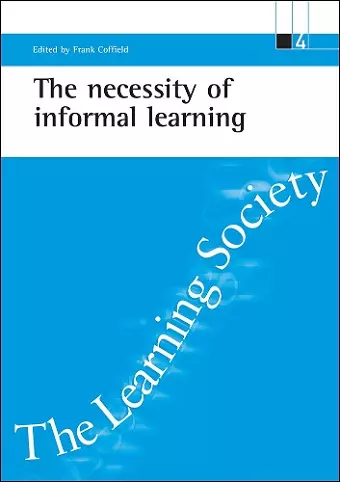The necessity of informal learning
Format:Paperback
Publisher:Policy Press
Currently unavailable, and unfortunately no date known when it will be back

This report argues for a fundamental reassessment of the significance of informal learning. Formal education and training represent only a small part of all the learning done in schools, colleges, at work, at home and in the community. Yet it is formal learning which is at the heart of the government's unshakeable determination to drive up standards by means of qualifications, national targets and league tables. A hierarchy of different types of learning has emerged with 'learning for earning' at the top and informal learning at the bottom. This report concludes, however, that an unjustifiable reliance on certification may serve to alienate informal learners. These 'learning entrepreneurs' argue that the formal training they receive is often dispensable, whereas their own informal learning is necessary and is very much part of who they are and how they interact with the world. A love of informal learning which is not linked to certification or to work appears to be a key characteristic of lifelong learners. The five projects from the ESRC's The Learning Society Programme represented in this report do not claim to be the first (but just the latest) to have 'discovered' the importance of informal learning. There is a long-standing tradition in the UK whereby policy makers, researchers and practitioners readily admit the significance of informal learning and then proceed to develop policy, theory and practice without further reference to it. We need to break this sequence by acknowledging that informal learning is not an inferior form of learning whose main purpose is to act as the precursor of the main business of formal learning. It is fundamental, necessary and valuable in its own right, at times directly relevant to employment and at other times not relevant at all. The potential of informal learning will, however, only be realised if government, companies and educational institutions reassess its central role in the lives of all learners. The case for informal learning has still to be won; indeed, it has scarcely begun to be heard. The necessity of informal learning is essential reading for all politicians, policy makers, employers, trade unionists and educationalists keen to create a culture of lifelong learning within the UK.
"It provides a good examination of the issues surrounding informal learning from a variety of perspectives. It is consistent with current political thinking and is recommended reading for the multi-professional readership of this Journal." Journal of Interprofessional Care
ISBN: 9781861341525
Dimensions: unknown
Weight: unknown
88 pages